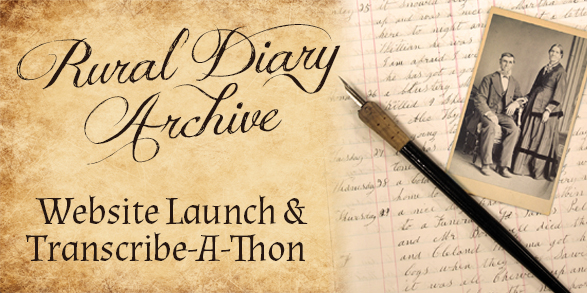
Read, Transcribe and Enjoy Rural Women’s Diaries Online
https://ruraldiaries.lib.uoguelph.ca/
Catharine Anne Wilson
Have you ever wanted to read someone’s diary? Now you can. Nothing brings you closer to rural women’s daily life in the past than reading an old diary.
The Rural Diary Archive is available online beginning 24 September 2015. It broadcasts the availability of rural diaries in archives across the province of Ontario, Canada and makes these handwritten and fading sources available to all. To date thirty-nine women are featured on the website with diaries written between the 1840s and 1980s. More are continuously being uploaded to the site.
Visitors can engage the diaries in three basic ways:
1) The MEET THE DIARISTS section showcases over 130 male and female diarists and their biographical overviews. Visitors can search this table to locate specific diaries in other archives or those available at the Rural Diary Archive. Meet Hannah Owen Peters Jarvis who once had servants and slaves but is now reduced to poverty and fashions her diary from scraps of paper. Enter the busy households of Quaker Alice Treffry and housekeeper Mary McCulloch or the tense relationship of Sarah Hill and her husband. Enjoy the sharp-tongued Matilda Hill and admire Margaret Griffiths who juggles market gardening with nine young children, or Mennonites Catherine Bowman and her niece who sew nine quilts in four months.
2) The SEARCH section contains the full text of several nineteenth-century transcribed diaries. These diaries are searchable and Accessible to those who use Assistive Technology readers. Minnie Booth writes with her new baby on her knee and keeps account of the butter, eggs and fowl she sells in Ottawa. Ann Amelia Day is preparing for her marriage. And Mary Green bakes and scrubs for her two aged uncles, then leaves to better herself by enrolling in the Dairy College at Guelph. It is noteworthy that some husbands record many aspects of their wives lives too. If you search “Polly” in James Carpenter’s diary you’ll see what he records about her purchase of fabric and their spats and heartache.
3) The TRANSCRIBE section contains the full text of several nineteenth-century handwritten diaries. Visitors can transcribe these online adding to what others have done to make these diaries searchable and Accessible too. With fine handwriting, Elizabeth Simpson writes about her flourishing garden, expanding poultry yard and bee hives and the lives of her seven children. Susan Smith’s diary will be available to transcribe in 2016 and how interesting it is. She writes, “… he told me how he loved me … wanted to kiss me good night but I could not see the point.”
Try transcribing. My distant cousins in Australia and Seattle and I, who have never met in person, are currently transcribing our great, great grandmother’s diaries online.
Contact: ru***************@gm***.com.
The Rural Diary Archive has been created by Dr Catharine Wilson and students in the Department of History. It is generously funded by the Francis and Ruth Redelmeier Professorship in Rural History and supported by the Archival and Special Collections, McLaughlin Library, University of Guelph.

Pingback: The women who came before us – The Rural Diary Acheive | Ag Women's Network